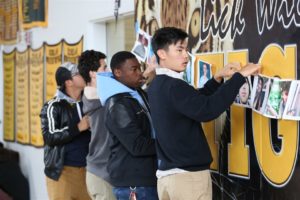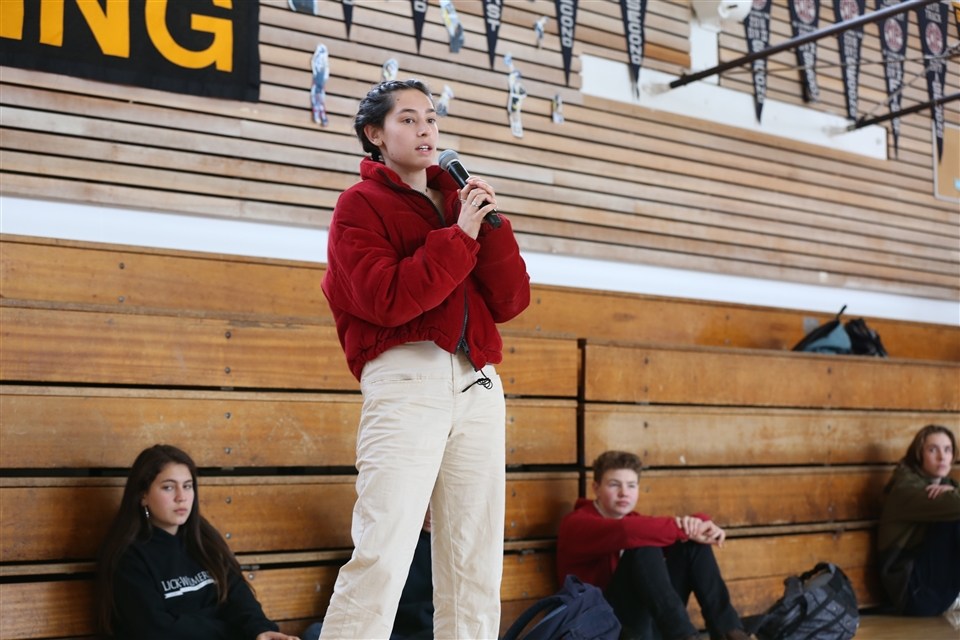
Just a day after the Marjory Stoneman Douglas High School shooting in Parkland, Florida, the 30th mass shooting in 2018, Stoneman Douglas senior David Hogg appeared on CNN with a message for President Trump: “Please, take action. Ideas are great…But what’s more important is actual action…saving thousands of children’s lives. Please, take action.” His call for action, along with those of many other Stoneman Douglas students, has inspired students to organize nationwide to demand for gun-control legislation from Washington.
Lick is no exception. After the six-day winter break, the Lick community returned to campus on February 21, 2018, and the administration had not yet addressed the events at Stoneman Douglas. On February 22, inspired by discussions they had about the shooting in their Ethnic Studies class, a group of senior organizers — Sarah Dean ‘18, Ella Harris ‘18, Royce Fong ‘18, Jay Kissel ‘18, Silvana Montagu ‘18, and Khloe Thomas ‘18 — posted flyers around campus announcing a student “walk-in,” an on-campus discussion that would address the shooting in the absence of an administration sponsored event. It was set to occur during the school day on the following Wednesday, meaning students would have to cut class if they chose to participate.
The day after the walk-in was announced, instead of advisory, the entire Lick community gathered in the gym to participate in an administration facilitated open mic. Head of School Eric Temple and English teacher Catherine Fung opened the space for student speakers. Acting under the misconception that the administration had only organized the event in response to their posters, the group of senior organizers went up to the microphone to announce that they were walking out of the gym to hold 17 minutes of silence for the 17 lives lost in the Parkland Shooting. Alongside them, a majority of the student body abandoned the gym, relocating outside, while about fifty students remained in the gym with faculty and staff members.
“We later learned that the assembly was planned without the teachers and administration knowing we were planning a walk-in because we put up our posters on Thursday afternoon, at the same time that the assembly was being planned,” said Dean. Adding, “However, in that moment of raw emotion, it felt like we needed a student space, and the school was trying to make an adult led space instead. Our mission for walking out was to counter complacency and normalization of gun violence, not to be anti-administration. However, we thought that the administration’s lack of acknowledgement of the shooting normalized gun violence. Regardless of it being a messy process, the dialogue that the walk-out started, and tension honestly, is moving our community towards more active engagement on these really important issues.”
The walk-out proved to be a moment of healing and togetherness for many students. After the 17 minutes of silence, Harris and Thomas invited students to come up and share their thoughts and emotions. Among the students who spoke, Jocelyn Murphy ‘20 said, “There’s been 18 school shootings this year…and none has shown up on my phone until now. [Gun violence] is becoming so normal that I don’t look at the notifications anymore.” Sha Cornelius ‘18 said, “The shooter, as well, is a victim of society.” And Journey Moore-Prewitt ‘21 shared an empowering message, saying “Are we going to wait for the next 17 dead to do something?”
Martin Mercy ‘19 chose to stay in the gym, remarking “I felt like walking out was sort of petty because it felt like it was done out of spite for the adult community. The teachers had created a space for students to talk, and I think we should’ve used it. I understand why other people were angry and felt like they needed to walk-out, but my only frustration was that I felt that a lot of students left due to peer pressure, which is to be expected in high school, but is still frustrating.”
In response to the student walk out, Temple said “I was a little sad, in combination with being proud that students were exercising their voice, in that I thought it was an opportunity to pull together as a community, and it felt a little oppositional. I also understand that students were really upset that we hadn’t acknowledged the shooting earlier. As an administration, we’ve met a number of times, and will continue to meet, to come up with a protocol of when and how we should respond to national events because it’s our responsibility, as adults, to acknowledge what really captures students’ hearts and minds. In some ways I really liked that Friday because students always ask permission, which is wonderful, but I think it’s healthy for them not to every now and then. It’s an important part of growing up to know when something is so important to you that you’re not going to ask permission, even if there might be consequences.”
On February 27, the day before the student-led walk-in, Temple sent a school-wide email, announcing that classes would be dismissed for half an hour to allow students and adults to participate, or not, in the walk-in. Though, students who chose to stay longer than the sanctioned half an hour would receive a cut, which translates to a 1.6 percent grade decrease for the semester in the missed class. Of this decision Temple said, “I wanted to send a signal that the adult community was supportive of the student initiative. At the same time, this was a student action; it wasn’t organized in coordination with any adults. We got some pretty strong messages last November when students left school after the 2016 election that they wanted more consequences for their actions, and this seemed like a good opportunity to respond to that. I’m always trying to work with faculty members to have the same parameters, but the faculty decided that they would be most comfortable with deciding how to handle it individually — some counted it as a cut and others gave a reflective exercise to make up the credit. That seemed like the best way to support the student community and to balance the needs of the adult community.”
At 1:00 p.m. on February 28, students and adults filed out of classrooms, either going to the gym to participate in the walk-in or to the library if they chose not to join. To open the event, the senior organizations read a statement that expanded on their motives and objectives for staging the walk-in; they said, “Many students have asked us why we are doing this today while disrupting the school day. We feel that this issue of gun violence and the dire need for gun control in this country calls for action and attention now, and disruption from the status quo is necessary to meet these needs. Today, we as a collective Lick-Wilmerding community are using our voices and bodies to stand in solidarity with the victims of Stoneman Douglas and of all gun violence in this country with the hope of moving towards action.” After the community participated in another 17 minutes of silence, many students and teachers returned to class, as the administration-sanctioned half an hour had concluded.
The students and adults that remained discussed next steps, brainstorming initiatives such as letter writing campaigns to senators and House representatives, picketing gun shows, a safety procedure assembly at Lick, and increasing Lick’s counseling staff to offer improved emotional support to students, especially those who may feel isolated.
Olympia Francis Taylor ‘18, one of the students who participated in the walk-in, has been running a voter pre-registration and registration drive at Lick for the past month. “I came to the idea after the Parkland shooting, specifically after watching the Town Hall on February 22 and the seeing the #VoteThemOut circulate social media. Though the idea of banning all assault weapons or enacting campaign finance reform are great ideas, that I agree with, I don’t think they’re entirely feasible to do in the next year. I saw this as, though a smaller, a more impactful step to take. There’s an element of voter suppression that it isn’t easy to pre-register and register to vote and, it’s a sad fact that so few people know that pre-registration is a possibility — it’s something that I didn’t know about until a month ago. Voting is one of the most important ways we as young adults can create change,” said Francis Taylor.
On the one month anniversary of the Stoneman Douglas shooting, the Lick-Wilmerding community, like thousands of high schools around the nation, participated in the “Enough!” National School Walkout, which was organized by the Women’s March Youth group. During the weekly, all-school assembly, school co-presidents Erica Thompson ‘18 and Alex Martinez ‘18 led the community to Balboa Park, where students and adults stood in a circle holding hands for a minute of silence.
While the recent marches and walk-outs are momentous steps towards healing and focusing energy to work for change, both at Lick and nationwide, it is essential that students continue to make their voices heard. “There’s always an ebb and flow with activism because it’s easy to lose energy. But I do think that students have to support each other in order to keep the momentum going. We need to take care of the periphery — the students who might feel marginalized — and we need to create a community where they feel connected. I think acknowledging people is a really simple way to create belonging. It’s going to be a long haul, but this is a really powerful political lobby of young activists. I’m really hopeful and reengaged by the work of students,” said Temple.
Visit lwhs.org/studentaction to see upcoming student-led events, or if you want to organize your own initiative.
http://bit.ly/2Fq6ySM Contribute to Lick students’ letter to demand gun control legislation from California representatives.






